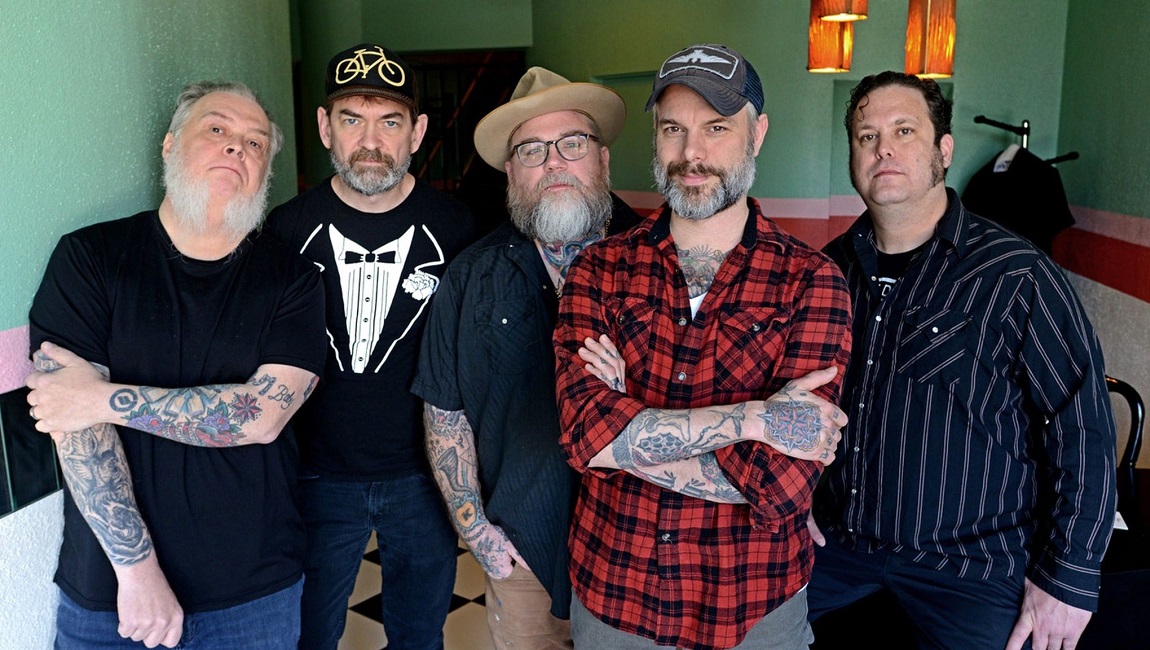Rhiannon Giddens & Francesco Turrisi
Rhiannon Giddens may not be the only musician who recorded an album during lockdown, but she may be one of the best-suited for such a project. For one thing, she spent quarantine with her partner, the jazz instrumentalist Francesco Turrisi, with whom she previously collaborated on 2019’s there is no Other. United by a love of acoustic instruments and a passion for cross-pollinating global folk traditions, Giddens and Turrisi have a knack for duo recordings that sound at once intimate and robust; whatever austerity is implied by their stripped-down configuration, they conceive of their music almost orchestrally, resulting in a full, richly textured sound. The other thing that gives Giddens a leg up on Covid-era home recordings is her subject-matter expertise in folk music: She has a vast personal library of ancient wisdom at her command, including mossy old tunes that reckon with death, loneliness, and the notion of home — timely concerns, one and all. The resulting album, They’re Calling Me Home, plays very much like a matching bookend to the Joe Henry-produced there is no Other, to the point that, if you didn’t know better, you’d naturally assume they were recorded during the same sessions.
But if They’re Calling Me Home feels just as intimate and just as borderless, it’s notably more interior in its concerns: where the previous album rebuffed the Trump era’s socially-acceptable xenophobia by inviting us to consider our human connectedness, the new one casts its eye toward mortality, solitude, and homesickness. The centerpiece, a fierce update on the well-known “O Death,” sets Giddens’ pleas of lament against the rolling thunder of Turrisi’s percussion. There’s also “Waterbound,” an old fiddle tune about being physically unable to go home, featuring Giddens’ viola and a sparkling guitar cameo from Niwel Tsumbu. One of the underlying premises of these Giddens/Turrisi albums is to blur the lines between different folk traditions, hence the inclusion of an Italian opera piece (“Si Dolce è’l Tormento”) — a perfect showcase for Giddens’ clear, precise phrasing — alongside gospel and blues standards, globe-spanning instrumentals, and a Giddens original called “Avalon” that sounds like it could just as easily be an unearthed Irish ballad. Pentangle’s “When I Was in My Prime” unites the album’s metaphysical concerns while providing the best showcase for Giddens’ astonishing vocal crispness and control. The album ends with a willowing, benedictory version of “Amazing Grace,” at once instantly recognizable and radically transfigured — as if to remind us of the way in which songs, like prayers, can reflect their times even as they echo through the ages.
Writer: Josh Hurst Section: Rooted & Restless

Credit: Justin Bieber/Instagram
Justin Bieber
Offering a second helping of solipsistic pop psalms just in time for Easter, Justin Bieber has “blessed” listeners with a new EP worth of material only a mere month after his last really bad studio album. Freedom. — dramatically stylized with a period at the end, so you know Justin is really serious about this — is his first overtly Christian release, which might help to explain why it’s gotten nearly zero coverage by most major music outlets. Which is not to suggest that the Christain faith has been wrongfully persecuted by the mainstream media over the past few years (one can reasonably assume most of the vitriol a reborn Kanye West has faced was more politically motivated), but it has more or less become a musical mode most won’t critically engage with: most writers understand that covering this now niche genre requires a great degree of theological knowledge and personal good-will regarding the given topic to not come off like a cranky, clueless smug asshole — or, really, like Bill Maher every time he opens his mouth. So take the following pan not as a polemic aimed towards a particular religion and more as an attack against the rampant appropriation of such iconography for personal gain. In a sense, Jesus is here what MLK Jr. was on Justice: a prop, some nice window dressing to make you think better of its lead artist.
After adopting a Jamaican blaccent on the watered-down dancehall title track, in a similar fashion to when his Canadian brother Drake raps about his “tings,” JB delves into the meat and potatoes of this affair: a series of platitudinous tracks on faith and spirituality in a COVID-ravaged world. This abstract sort of engagement would seem cute if spouted by a semi-clueless teenager; but at 27, Bieber, possibly the least self-conscious megastar alive, reveals he contemplates life in some rather simplistic terms. On the acoustic “We’re In This Together,” he speaks on how “I’ve had everything in life that people strive for/Just to ask the question: “What are we alive for?” suggesting material wealth only provides momentary happiness and doesn’t fulfill one’s purpose in life; a lame, sorta obvious point that comes off as facetious finger-wagging from a horrendously wealthy socialite. And this doesn’t even compare to how outright offensive his ethos gets when he claims on the chorus that “One thing I know is we’re in this together” which, considering the current state of things, are we really in this together, Mr. Millionaire Justin? (Also, tell that to Lil Twist).
Things somehow get even worse as Bieber posits, on “Afraid to Say,” that Jesus would never cancel anyone, which is one of the biggest problems plaguing society at the moment. Besides this being an alarmingly untrue conservative talking point, with issues such as poverty, unemployment, inequality, racism, and immigration being far more prevalent for most Americans (maybe this is strictly an Ontario thing), it brazenly reeks of a privileged manbaby lamenting that the woke mob is about to get him. He frames this message to speak about all mankind — “We can’t write people off/God never writes us off/Even in our darkest days, even when we least deserve it” — when it’s beyond obvious what he’s really doing here: cleansing himself wholesale of his own sins, rhetorically asking “And can’t there be room for maturity?” to make all these critics out as the real bad guys for not granting him enough leniency. As proven with his other pity-inducing closer from 2021, “Lonely,” there’s never an opportunity Bieber won’t take in making you feel bad for him.
Not even the actual musical side of things can save this awful songwriting, with lowkey instrumentals and cheap instrumentation serving as unregistrable background noise for awkwardly inserted sermons. This approach is most apparent on “Where You Go I Follow,” which features an extended spoken-word outro from pastor and long-time close friend of the Biebs Judah Smith, set to a limp trap beat. His looming, sedated voice sounds as half-hearted as the rest of the material on Freedom., which further cements Bieber as an egotist who barely seems to grasp the basic tenets of his religion beyond the whole forgiveness angle and how it affects his bottom line. If Justin’s supposed lord and savior died for his sins, it seems as if his disciple has failed to nail down the apparent sentiment — which is the total opposite of how the Romans were able to nail him down, if ya know what I mean.
Writer: Paul Attard Section: Pop Rocks
Dinosaur Jr.
At this point, it’s hard to envision the version of Dinosaur Jr. that became so fractured by the end of the 1990s. Much of the band’s initial, storied run was marked by tumult and animosity — and it all sourced back to laconic mastermind J Mascis, whose auteurist obsessions would turn Dinosaur Jr. into a virtual one-man band by the time of 1997’s Hand It Over. That particular album also marked the last use of the Dinosaur Jr. name — at least, until Mascis reconciled with founding bandmates Lou Barlow and Murph, around 2005, and the trio quickly fell back into a fairly regular touring schedule, while also recording albums with some frequency. The first two of these post-hiatus records still probably stand as the high points of this iteration of the band: 2007’s Beyond and 2009’s Farm. But the records that have come after have had their own merit, one reflective of both the group’s next-level musicianship and of a newly harmonious dynamic. Sweep It Into Space (the twelfth Dinosaur Jr. album, eighth with this lineup) is another release in the latter mold, and finds the band at relative ease. But it’s also somewhat of a wistful record.
Produced by Mascis, in tandem with Kurt Vile — a sensical, though practically on-the-nose choice; the spacey folk-rocker an obvious descendant of this band, and not unsimilar in persona to his co-producer here — Sweep It Into Space may be Dinosaur Jr.’s least confrontational record, so almost entirely free is it of the distortion and aggressive feedback that has long characterized the band’s approach to composition. With this absence, Mascis’s pop songwriting expertise is laid bare (he wrote all of these songs, save for lead single “The Garden,” a sort of a standalone track at the album’s midway point that was penned and sung by Barlow). The slight reworking of the band’s aesthetic was presumably influenced by Vile: Each song here is not only stripped back to the point of becoming straightforward (though still jam-y) pop-rock, but Mascis’s vocals seem to favor a drawl and his guitar a heavy, dynamic southern rock, as if there was an attempt to bring the group closer to their outside producer, in terms of artistic alignment. It should be noted, of course, that Dinosaur Jr. have drawn on these elements in the past; they just seem particularly keen here to delve into classic rock and equip every song with pop hooks and nimble guitar solos.
Sweep It Into Space is also a surprisingly nostalgic album; it’s vulnerable without deflection, and celebrates both the longevity of this band and of their devoted audience. Mascis’s songwriting remains poignant and vague enough to project any and all interpretations onto it — as on album opener “I Ain’t,” which has him describing a need to be in conversation with others (“I ain’t good alone”), a sentiment that one could say is echoed across this whole album. A reciprocal statement arrives at the close, on “You Wonder,” as Barlow sings Mascis’s words (“My religion is a vision of you humming in my ear”). These snatches of lyrics, though, may make this album seem like more of an especially earnest work than it ultimately is: Mascis’s songwriting is still as sardonically edged as ever (the album’s second track, “I Met the Stones,” takes a droll, roundabout approach to addressing the band’s current day canonicity), just with an uncomplicated sense of graciousness from which he’s more often chosen to steer away. If not a substantial reinvention, Sweep It Into Space is at least an affirmation that Dinosaur Jr. understand their own strengths.
Writer: M.G. Mailloux Section: Ledger Line

Credit: Gabrielle Duplantier
Gojira
Five years after they released 2016’s Magma, French extreme metalheads Gojira are back again with their seventh studio album, Fortitude. And for anyone who has not been following the progressive death/groove metal that this quartet has been producing over these last 20 years, Gojira is one of those acts with a prominent cult following but who still push boundaries and challenge themselves (and their listeners) with each new album. That said, this latest effort from the group may still come as a surprise even for their most diehard fans: More so than on Magma, Fortitude finds Gojira stripping down and scaling back their aggressive energy, while trending toward a more prog-centric and experimental form, a more ruminative kind of approach. The first two tracks here (“Born for One Thing” and “Amazonia”) pay obvious homage to Brazilian metal veterans Sepultura (especially the Max Cavalera era), with heavy riffs and an underlying sense of groove. But the sludge-metal vocals with which those tracks’ instrumentals are paired simultaneously bring to mind Pantera — and that friction proves to be an accurate measure of just how diverse and eclectic Fortitude will get even before the band perplexes their listeners further with some Tool-inspired sonic complexities on songs like “Hold On” and “New Found.”
The combined emphasis on riffs and on the more melodic rhythms makes Fortitude a dynamic album filled with free, metamorphosing structures. Joe Duplantier’s vocals frequently alternate between dense, hoarse growls or an uplifting croon, and even delve into some spiritual intonations (the latter being most evident in the two-parter of “Fortitude” and “The Chant”). Christian Andreu’s guitar can evolve from palm-muted technique to multi-layered, sprinting riffs, or to repetitive, slow-building harmonics. And Jean-Michel Labadie’s basslines, in tandem with Mario Duplantier’s thundering drums, bring depth and intensity to every one of the compositions here. Together, this ensemble can unleash explosive, fulminating sounds that invigorate tracks like the straight-forward, sing-along-friendly anthem “Another World,” or the mid-tempo grooves of “Sphinx” and “Into the Storm.” Meanwhile, a song like “The Trails” resonates with a more introverted mood — an emotional calm that flirts with easy-listening at times. Finally, all of these disparate approaches are brought together, masterfully, on Fortitude’s closer, “Grind”: refined, technical metal, with bouts of extreme heaviness, that’s galvanized by (bitter)sweet melodies.
Magma was almost overwhelmed by grief and sadness, no doubt due to the death of the Duplantiers’s mother. Fortitude, though, finds a Gojira willing to embrace a broader emotional spectrum, one reflective of a sense of hope and inner strength, or even the regaining of power — as reflected in the lyrics for both “In the Storm” (“Gather your strength, raise your eyes / Fear not the demons you’re up against”) and “The Chant” (“Leave the mud behind and climb up to the sky”). Conceptually, this also allows Gojira to connect their modern extreme music with more heady concerns (as has been a tact that they’ve deployed in the past), as is best represented here by the environmentalist preoccupations of “Amazonia.” Perhaps most impressive, though, is this band’s ability to hold down all its ambitions while still preserving their eccentricity and noticeably moving into a more mainstream domain (comparisons to Mastodon and Meshuggah in recent years aren’t unwarranted). Which is to say that Fortitude is, in sum, the least brutal and harsh Gojira album, a point that’s sure-to-be-divisive for fans, but also their most coherent and mature and still heavy work to date — we’ll stop just short of calling it their best, though.
Writer: Ayeen Forootan Section: Foreign Correspondent
Demi Lovato
It’s often said that when someone experiences a traumatic event, their life splits into a “before” and an “after.” Demi Lovato’s new album, Dancing With the Devil…The Art of Starting Over, signals an ambition in line with this through the bifurcation of its title: The album chronicles two periods of Lovato’s life, with a clear division between them. In 2018, after struggling with addiction for many years, the former Disney Channel star-turned-super successful pop icon overdosed and nearly died. This event, of course, marks a turning point — and “after” the experience, they intend to leave everything raw and open, to be viewed by and picked at by their fans and detractors alike.
Opener “Anyone” is a cry for help (“Nobody’s listening to me / Nobody’s listening / I talk to shooting stars / But they always get it wrong”) that, unfortunately, is built around a grating, aggressively radio-pop melody that only intensifies the broadness of the message — a nondescript sadness that could be about anything, rather than a more specific plea for solace and community. The same generic approach to exploring this theme is felt on “Dancing With the Devil,” a song that’s obviously about their addiction and overdose (“Almost made it to heaven / It was closer than you know”) but whose lyrics never dig deeper, and largely just rely on some strong production to project a sense of seriousness. Not until “ICU” — about Lovato’s experiences immediately after their overdose (she woke up in the hospital and found that she had temporarily lost her sight) — does Lovato seem to find her footing, and a coherent theme. But this is also when Dancing With the Devil…The Art of Starting Over shifts gears, and into the second half of that title.
There are certainly many harrowing subjects addressed on this second side of the album — struggling with eating disorders (“The Way You Don’t Look at Me”), a lack of commitment to monogamous ideals (“The Kind of Lover I Am”), the dissolution of an engagement (“15 Minutes”) — but the music itself just doesn’t support the weight. In fact, a lot of the instrumentals for these tracks don’t sound far off from the kind of thing one might hear soundtracking a Disney Channel series — an impression that becomes instructive, in terms of understanding the problem with this album. It can’t be denied that Lovato has gone through trauma in their life, or even that their lyrics are at least trying to address it — but their music hasn’t done any growing yet.
Writer: Andrew Bosma Section: Pop Rocks







